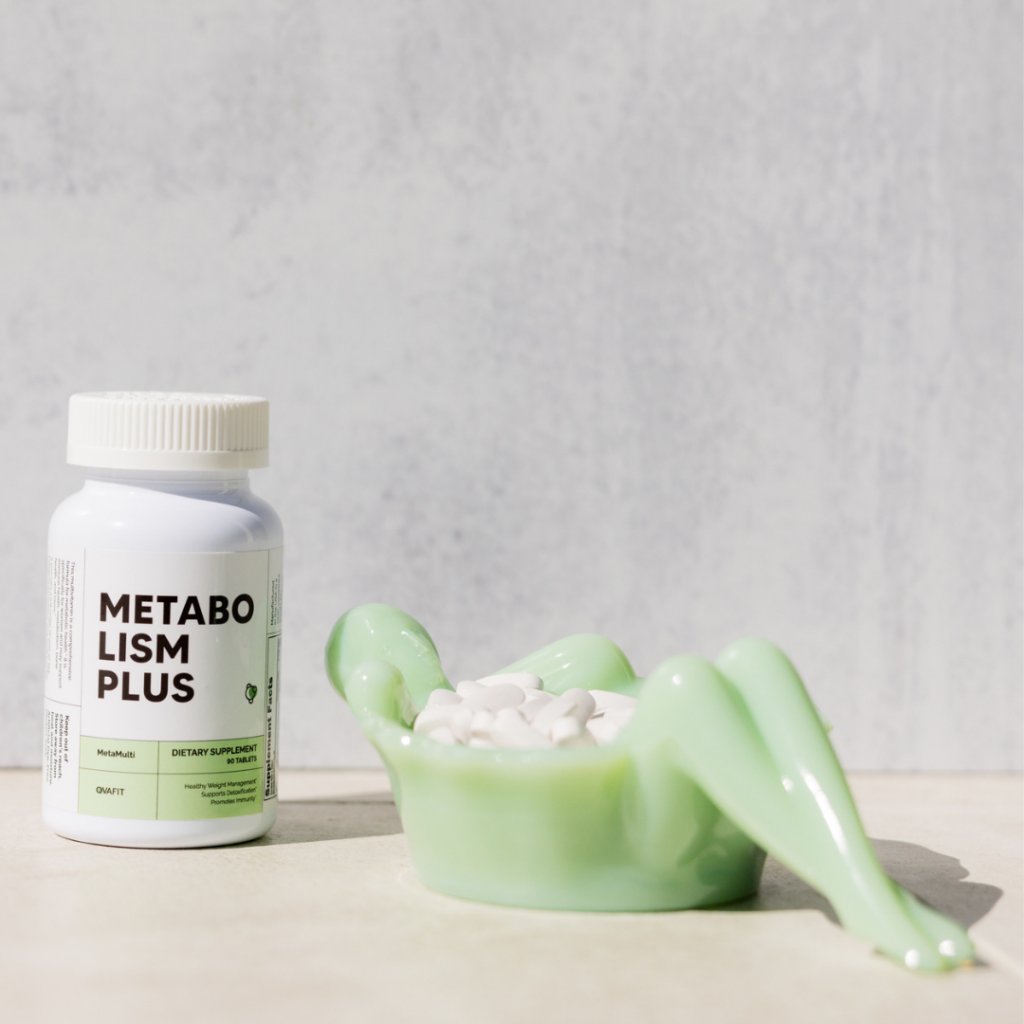
Everyone should consider taking supplements. No matter who you are and how intentional your diet is, getting all the recommended daily nutrients is HARD. When your body doesn’t have the vitamins and minerals it needs, it can’t function optimally.
So, if you have polycystic ovarian syndrome (PCOS) and your body is already struggling to work like it’s supposed to (whether you’re having issues with fertility, digestive health, or something in between), taking dietary supplements is even more important for you!
Taking something as simple as a high-quality multivitamin with vitamin D, zinc, chromium, and other intentional vitamins is not only good for you, but it can also help relieve tons of PCOS symptoms! Women with PCOS are often running on deficiencies and imbalances that are the actual cause for many symptoms, like hair loss, weight gain, acne, fatigue, and more.
But, I get it. Looking down the vitamin aisle is completely overwhelming. There is SO much there, most people don’t even know what to grab. Well, a great place to start is a multivitamin! So, I’m dedicating this post to multivitamins for PCOS!
Here’s what you need to know.

The Ultimate Guide to PCOS Multivitamins
First of all, what’s inside a multivitamin really matters. Someone with PCOS has different needs than someone who doesn’t. Everyone is different, and you need a multivitamin well-suited for your unique body. This is what you should look for in a multivitamin.
Vitamin A
Women with PCOS often struggle with their periods, and, with that, fertility. Vitamin A can help regulate hormones and get periods back on track.
Vitamin A can help with PCOS by:
- Regulating menstrual cycles
- Boosting fertility
- Supporting thyroid function and hormone balance
- Improving immune health
Vitamin C
Vitamin C can help with hormone balance, which is huge for PCOS! It has a domino effect on immune health, fertility, and plenty of other PCOS symptoms.
Vitamin C can help with PCOS by:
Vitamin D3
Managing PCOS is all about breaking the cycle between hormonal imbalance, insulin resistance, and inflammation. Vitamin D3 can be really helpful for all three factors.
Vitamin D3 can help with PCOS by:
- Increasing insulin sensitivity
- Promoting hormone balance
- Boosting fertility
- Reducing inflammation
- Regulating mood

Vitamin E
Vitamin E has similar benefits to vitamin D3, which means it helps get to the root of your PCOS symptoms.
Vitamin E can help with PCOS by:
Vitamin K
Cysters are at a greater risk of cardiovascular disease, and certain hormone imbalances can affect your bones too. Luckily, vitamin K can help support your hair and bone health.
Vitamin K can help with PCOS by:
Thiamin
You’ve probably heard of the benefits of B vitamins. Vitamin B1 is actually also known as thiamin on multivitamin labels! It can be a big help to your metabolic health!
Thiamin can help with PCOS by:
Riboflavin
Riboflavin, AKA vitamin B2 can further improve your metabolic functioning, but it’s also got skin health boosts! This is great, because many women with PCOS experience skin problems.
Riboflavin can help with PCOS by:
Niacin
Here’s another B vitamin! Niacin, (vitamin B3) can help stop that insulin resistance cycle and improve your cardiovascular health.
Niacin can help with PCOS by:
Vitamin B6
Vitamin B6 has similar benefits to nutrients I’ve already listed, but it also can positively affect symptoms of depression and anxiety. (Which is unfortunately common with Cysters.)
Vitamin B6 can help with PCOS by:
Biotin
Biotin (AKA vitamin B7 or vitamin H) is thought of as being super beneficial for skin and hair health. Though this is true for people with an actual biotin deficiency, there’s not a ton of evidence to show it helps others in that department. However, it can benefit Cysters due to the fact it can help reduce insulin resistance.
Biotin can help with PCOS by:

Pantothenic Acid
Pantothenic acid (vitamin B5) can help women with PCOS in a few ways, including regulating the release of cortisol (stress hormones). This can have positive effects on lots of PCOS symptoms!
Pantothenic acid can help with PCOS by:
Choline
The liver is essential for flushing out toxins and excess hormones. Luckily, choline can help with detox by supporting liver function.
Choline can help with PCOS by:
Calcium
We’ve all heard the benefits of drinking milk! However, many Cysters choose wisely to cut dairy from their diet. When you do, calcium supplementation can be a good idea.
Calcium can help with PCOS by:
Iron
Because women with PCOS have heavy menstrual cycles, they can often experience an iron deficiency and become anemic. This causes lots of negative symptoms, so iron is key in a multivitamin.
Iron can help with PCOS by:
Iodine
Thyroid PCOS is a common type of PCOS that has a unique set of symptoms. Promoting thyroid health is good for anyone, but especially for Cysters! Iodine can help the thyroid do its job.
Iodine can help with PCOS by:
Magnesium
Magnesium is essential for Cysters! I have a whole post on the benefits of magnesium for PCOS, but it’s one of those big ones that can help break the cycle of inflammation, insulin resistance, and hormone balance.
Magnesium can help with PCOS by:

Zinc
Zinc is another top vitamin that’s a must for a PCOS multivitamin. It can help regulate androgen levels (testosterone levels), which can help you see lots of symptoms improvement! Here’s more on the benefits of zinc for PCOS.
Zinc can help with PCOS by:
- Promoting hormone balance
- Increasing insulin sensitivity
- Improving immune health
- Bettering hair health
- Bettering skin health
Selenium
Here’s another one for thyroid health! Improvement in thyroid health can result in improvements in hormone balance and immune health as well!
Selenium can help with PCOS by:
Copper
Hair and skin health is a common woe of Cysters like myself, but supplements like copper can help make your skin much healthier by promoting collagen production.
Copper can help with PCOS by:
Manganese
Manganese can help reduce your risk of cardiovascular disease by helping manage cholesterol and blood sugar levels.
Manganese can help with PCOS by:
Chromium
If you’ve noticed a trend, insulin resistance is a big deal for a woman with PCOS. Supplements like chromium to support reducing that resistance is key to natural healing.
Chromium can help with PCOS by:
Molybdenum
Lastly, molybdenum can aid in detoxification to pass any excess hormones causing problems!
Molybdenum can help with PCOS by:

How To Choose The Best Multivitamin For PCOS
Make sure it’s NSF-certified.
Supplements aren’t regulated like prescription drugs are. The FDA isn’t jumping in to confirm all the claims are legit and the supplement is high quality. Because of this, it’s SO important to get a supplement that’s third party tested. And, in my opinion, the most reliable third party is the National Sanitation Foundation. Before you grab a supplement, look for that NSF-certification!
Ensure it fits with your PCOS friendly lifestyle.
If you’re taking steps to manage your polycystic ovary syndrome (PCOS) with diet, first of all, GREAT JOB! An anti-inflammatory dairy- and gluten-free lifestyle can do wonders for many Cysters looking to find relief from their symptoms.
However, not all nutrients will be found in our food no matter how hard we try, which makes a multivitamin so important. And, a lot of foods contain additives, fillers, GMOs, and artificial colors that you don’t need hindering your PCOS management journey. Check those labels and confirm everything supports your goals!

Pick one that has iron.
Many women with PCOS have long, heavy menstrual cycles. Heavy bleeding during periods has been linked to iron deficiencies. Plus, there are other things like obesity that can lower iron levels. All this can cause symptoms like fatigue, mood problems, headaches, and more. So, iron is important for PCOS—make sure it’s in your multivitamin.
Consider absorption and the quality of the vitamins.
The quality of vitamins and minerals matters! You want all the nutrients to be super bioavailable, so you get full benefits from your multivitamin. I mean, what’s the point of spending money on a multivitamin where you pass the nutrients before your body can actually absorb and use them? Do research on the quality of the vitamins to make sure they’re the best of the best! But, I’ve got you below with some really good suggestions.
Check the dosage.
Too small a dose of certain vitamins may mean you need additional supplementation to see effects. However, too high a dose could have health consequences that lead you with more side effects than you started with. Most multivitamins will have safe levels of each nutrient, but discuss the dosage of each vitamin with a doctor before taking it.
Look into the company’s credentials and reviews.
Like with anything, it’s a good idea to look into the company you’re purchasing from. Reviews will tell you a lot! Plus, when you go through their website, you can find information on their certifications, processes, and values to ensure they align with what’s important to you.
Be mindful of the gaps.
A multivitamin may help you see symptom relief in a lot of ways, but don’t expect it to completely turn your health around either. Multivitamins are great when combined with lifestyle changes and other supplements that serve your specific needs. There are other potential deficiencies you have as a woman with PCOS that other women don’t, so do your research on potential gaps, consider getting labs done on your hormones, and purchase more supplements to give your body all the help it needs to get well!
Psst . . . research shows one of the best supplements you can take for PCOS is d-chiro-inositol and myo-inositol in a 40:1 ratio. This will not be in a multivitamin, so taking Ovasitol is a smart supplement to add to your routine! Here’s more on other beneficial supplements for PCOS.
Find something specifically designed for PCOS.
At the end of the day, you need something tailored to your unique condition. A woman with PCOS has specific needs not every multivitamin is going to serve. Getting a multivitamin like Ovafit MetaMulti that was researched, formulated, and produced with PCOS in mind from the start, is the best way to get the most from your multivitamin purchase.
Plus, getting a multivitamin curated for PCOS takes the hassle out of shopping around! If you have PCOS, you know it’ll probably work for you. As a Registered Dietitian with PCOS, I went on my own natural healing journey, and it would have been much easier with the help of supplements made for me. That’s why I worked with a team to create Ovafit! It’s NSF-certified, affordable, and made for Cysters like us!
Always consult with your doctor.
Never start any supplement without contacting your doctor first. Natural healing is meant to be pursued in unity with traditional medical care for the best whole-body solution to your PCOS.

Find a multivitamin that’s made just for you and your PCOS!
Shopping for multivitamins is stressful. It’s especially stressful when you’re not just taking the multivitamin for general wellness, but you’re actually taking it for symptom relief and natural healing. It’s important to you that you feel the effects of your multivitamin!
The best supplement for so many Cysters is Ovafit. Every supplement in the line, including the MetaMulti multivitamin in the Metabolism Plus bundle is top-quality and designed just for you! You can shop for it and find more information on PCOS supplements at Ovafit.org. I can’t wait to be with you on this healing journey!






Related posts
What is the Connection Between PCOS And Metabolic Syndrome?
Do You Gain Weight During Ovulation?
14 PCOS Friendly Recipes for Weight Loss
PCOS Tea Blend Recipe to Reduce Testosterone
A Guide to PCOS Blood Sugar Balance
5 PCOS Supplements For Weight Loss
PCOS Cravings: Everything You Need to Know